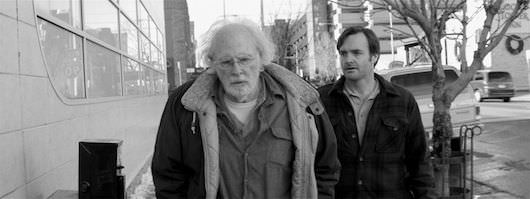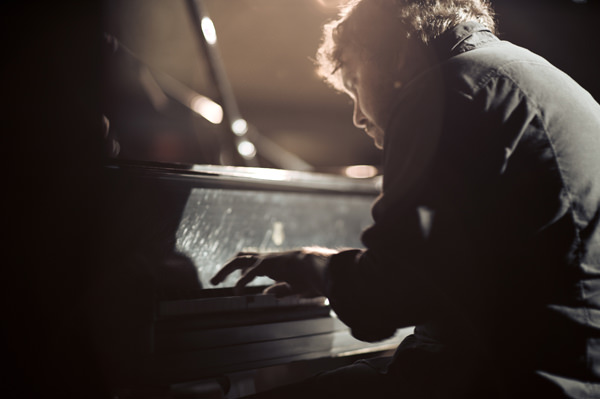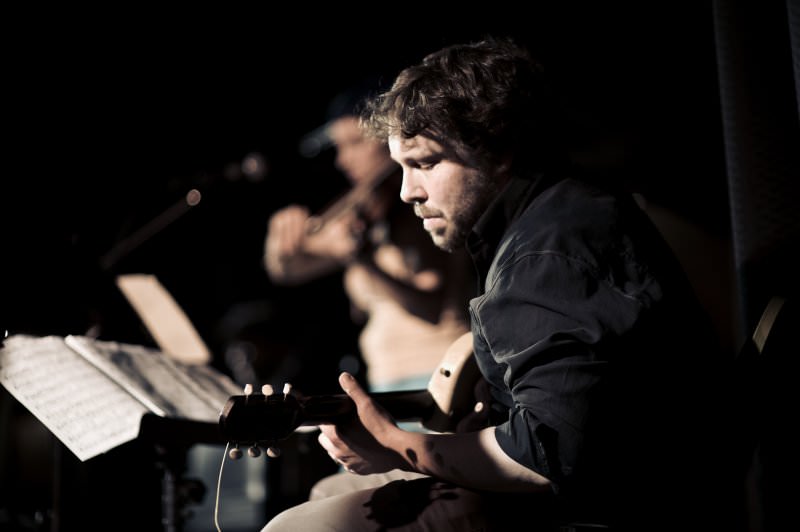Multi-Instrumentalist Mark Orton on Composing Alexander Payne’s Nebraska
Mark Orton is a man of many talents. He can play on any type of guitar, keyboard and percussion instrument. He’s a trained sound engineer and composer. He’s provided scores for feature films, documentaries, experimental radio, video/art installations, concert halls, modern dance, theater and, wait for it—the circus. He’s a co-founder of Tin Hat, a composer/improviser collective that is internationally renown.
Orton’s path to becoming the composer for Alexander Payne’s critically acclaimed Nebraska is an unusual one, but the results were wonderful. Orton’s score, haunting and lovely, is a perfect match to the gorgeous, sparse black and white landscape so vividly captured in the film. The music feels like a character itself—his classic guitar (among other instruments) plays accentuates the rural plains of Payne's moving father/son road trip movie, often in dialogue-free moments. As Woody (Bruce Dern) and his son David (Will Forte) drive from Montana to Nebraska to collect on the winnings Woody falsely believes he's won, Orton's music carries across state lines and into the interior lives of these flawed, fully realized human beings.
Orton takes us on the journey that led him to team up with Alexander Payne, discusses his many influences, and his love for all things with strings.
So walk us through how you ended up working on Nebraska?
The music editor on the film, in an early version of the cut, used a couple of tracks of my band Tin Hat. Our stuff gets licensed for film a lot, and I found out from my agent that there were a couple of our tracks in the temp score for this new film, and he said to get in touch with the music editor, Richard Ford, who is also the score producer on the film. So I sent him a bunch of things and at the end of our back and forth, of the twenty-eight music cues on the film, twenty-seven of them were mine, and the twenty-eighth was from my band mate, Rob Berger. So this early score was very much our score.
It's a pretty unusual way for a composer to get involved in a film. Was it as simple as that, they liked the temp score so much they just found the artists who made it and hired you?
At that point Alexander was still planning on working with Rolfe Kent, as he has on all his films except for The Descendants. I agreed to come on board to help with the cut for Cannes. We went in and I wrote some original music for that, but most of the songs for Cannes were a few themes I'd written for other films and some stuff from Tin Hat. Alexander actually came up to Portland and we recorded strings and some piano, harp and a handful of instruments, but we kept it relatively close to the temp score. After the success at Cannes, Alexander felt that he just fell in love with the music, and it felt like the music for the film, so they brought me on board. At that point I went back in, and we ended up using a couple of themes from a feature I did back in 2007 called Sweet Land, a couple of Tin Hat tracks, some library stuff, and then about a third of it was written explicitly for the picture.
It really feels that every note of the music was written explicitly for that beautifully bleak plains landscape.
That's good to hear. The sad part about it is we weren’t able to submit for the Oscars because it doesn’t meet its criteria in terms of music explicitly written for the film, because we were using these existing themes that Alexander loved so much.
Who did you work with to craft the music?
I worked with some session players in LA, I worked with my wife, who is a violinist and fiddler, who plays on a bunch of the main themes, I worked with some of my band mates from Tin Hat, and some folks from the Oregon Symphony and some great players from Los Angeles. That’s how we put it together. Alexander was looking for something really organic with a handmade feeling. He didn’t want a standard, session players score.
Can you describe the process of crafting music around a specific scene?
First off, I’m following the lead of the director and getting a good sense of what he or she is or is not looking for. For Alexander, who’s a musician himself and really knows what he wants in terms of music, there were certain things that he definitively didn’t want. He didn’t want it to be overtly Americana, like O Brother, Where Art Thou? Early on he made this comment where he imagined this as Italian cinema on the plains. The film has some sentimentality in it, and the way it grows is one of the remarkable things about the film. To me, these characters start out somewhat unlikable, and by the end you have empathy for all of them. As David grows to know these other sides of his father, the audience is with him. I tried to reflect that in the music. Never did I go for anything schmaltzy, and that wouldn’t have flown if I had.

The score is another story telling tool.
I’m looking at the character arcs, I’m looking where those characters are within the narrative, and all of those things are informing my decisions about the music. In this particular film there’s so much music that’s going on without any dialogue. There are twenty out of twenty-eight cues that are only cinematography and music. So it’s not like I’m creating textures under dialogue and trying to stay out of the way of actors, or worrying about supporting lines. I have a lot more melodic freedom, so the score is a lot more thematic than it would be under something like Before Midnight [the dialogue heavy final film in Richard Linklater's trilogy]. It's a different set of rules in this film because it’s a road movie.
How do you match your music to the inner lives of characters?
I think instrumentation has a lot to do with it, and I think that early on in demos that I was making for Alexander, I went for a few things—bigger strings and even some brass—and everybody in the end thought that it was really nice to keep it spare and intimate because it played better with the inner life of the characters, rather than something big and sweeping. This smaller, sparer instrumentation helps stay with the inner life of these characters. So much about Woody is unspoken, even within his acting, there’s so much to the film that’s about what’s going on, or isn’t going on, in his brain [laughs].

How many instruments do you actually play?
I play all manner of guitars, this includes things like a dobro banjo. I actually collect instruments, and my wife things I have an actual problem. Specifically an eBay problem. I collect a lot of antiques; I have lots of stuff going back to the Civil War. Strange instruments that were sold door-to-door in the late 1800s, various autoharps and zithers and Marxophones, a collection of weird harmonicas, a collection of harmoniums—I play all manner of stringed things, all manner of percussion instruments, including orchestral percussion, and then all manor of keyboards. It’s a way to keep music fresh and understand things from different perspective, and it’s a way to avoid idiomatic composing.
How does this kind of multi-instrumental approach help you when you’re working on a film score?
I write orchestral music. I love composing. I really feel most at home composing. Because I have this broad range of instrumentation, and because I have an engineering background as well, I’m able to produce my own things, mix my own things, I’m able to build these scores that hopefully have a little bit more personality than some of the stock, sampled, digital instrument based scores or ones that are played in three hours by a session orchestra.
What’s your plan going forward with film scoring?
I’ve got three features coming up now. One’s at Sundance next month, it’s called Drunktown’s Finest, another one with Harry Lloyd of Game of Thrones fame called Big Significant Things, which is actually a road movie around the south, and I’ve got a film called My Old Lady, which takes place in Paris, with Kevin Cline, Maggie Smith and Kristen Scott Thomas, it’s a BBC-Films feature. I do imagine spending the bulk of my career doing this while keeping my feet in a few other musical places.
Can you tell us about other composers you admire?
A lot [laughs]. Jesus, where do I start with that? One who I truly, truly love is Gabriel Yared, who is probably best known for The English Patient, but the score I particularly love is for the German film The Lives of Others, a fabulous score. I really like Carter Burwell, I’m a big Coen brothers fan and I love a lot of what he’s done with them and in other settings. And I like a lot of the classic stuff—I grew up on a lot of Ennio Morricone’s stuff and Nina Rota’s stuff, he’s been a big influence in Tin Hat. I really love Bernard Herman, who originally worked with Orson Welles on radio plays…that’s an era I really love.




